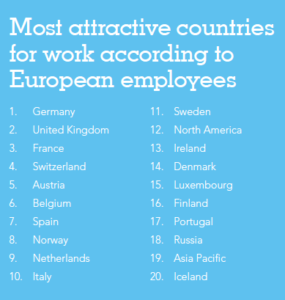Europeans like the idea of working abroad: research
Europeans like the idea of moving across countries for work. Almost three quarters (74%) are “likely to consider working abroad,” according to a research published by ADP, a human resources and management consultancy. The most interested in jobs outside their country are the Italians (88%), the Polish (86%) and the Spanish (85%). The least attracted by an international move are the French (54%) and the British (57%).
ADP surveyed almost 10,000 workers from France, Germany, Italy, the Netherlands, Poland, Spain, Switzerland and the UK. Their views were gathered in July 2016, just after the Brexit referendum, so it is likely the results of the vote had an influence.
 Compared to 2015, Germany overtook Britain as the most attractive destination “despite the arguably comparable, if not better, opportunities in the UK, and English being the more widely spoken language compared with German.” One in five European employees (21%) said they would consider relocating to Germany, a proportion that rises among Spanish (35%), Polish (33%), Italian (31%) and Dutch (29%) employees.
Compared to 2015, Germany overtook Britain as the most attractive destination “despite the arguably comparable, if not better, opportunities in the UK, and English being the more widely spoken language compared with German.” One in five European employees (21%) said they would consider relocating to Germany, a proportion that rises among Spanish (35%), Polish (33%), Italian (31%) and Dutch (29%) employees.
Language is clearly an important factor in considering relocation. Switzerland, for example, is popular amongst Germans, French and Italians; Austria is the most popular choice for Germans; Germany and France are popular with the Swiss. The Brits, instead, are most likely to contemplate a job in Spain.
Languages are also among the skills that employees are looking to develop, together with IT. Almost a quarter of people surveyed (23%) said they need help in these areas. Language skills are especially desired amongst those most interested in working abroad: Polish (35%), Spanish (31%) and Italians (29%). People in the UK and the Netherlands are the least likely to say they need to improve their language skills (15% and 7% respectively).
Age is another factor influencing the decision to move internationally: 87% of 16 to 24 years olds say they would be interested in a job abroad, compared to just 56% of over 55s. Men are more likely to move than women (82% to 64%).
As regards sectors, IT and telecom professionals are the most inclined to consider a job abroad (87%), compared to only 63% of those in healthcare. IT and telecoms are also the most optimistic sectors, with 85% of respondents feeling positive about job perspectives in the next five years.
Overall, optimism in the European workforce increased slightly in 2016 compared to 2015. More than three quarters (78%) of respondents felt very or quite optimistic about the next five years in the workplace, one per cent more than in 2015. The most optimistic country among those surveyed was Poland (84%), followed by Germany and the Netherlands. The most pessimistic was France, falling grom 75 to 71%. The largest drop in optimism, however, was recorded in the UK (from 81% in 2015 to 76% in 2016).
Signs of pressure over the British job market were highlighted in a LinkedIn analysis also published this week. LinkedIn looked at the behaviour of more than 3.5 million users and found that between May and July 2016 the number of EU professionals seeking a job in the UK fell by 18%. Interest in technology and finance firms in particular was down 14% and 12% respectively. University-educated professionals in the UK were also more likely to seek jobs abroad.
Joshua Graff, UK Country Manager & VP EMEA at LinkedIn, recommended British employers to understand how exposed they might be to a drop in international staff and invest in employee development to mitigate recruitment difficulties.
The ADP survey showed that a third of workers (31%) in Europe do not feel supported by employers in their career development. Dutch, Spanish, Swiss and British employees are those feeling most supported, French, Italians and Germans the least.
Claudia Delpero © all rights reserved.
Photo: Pixabay.






